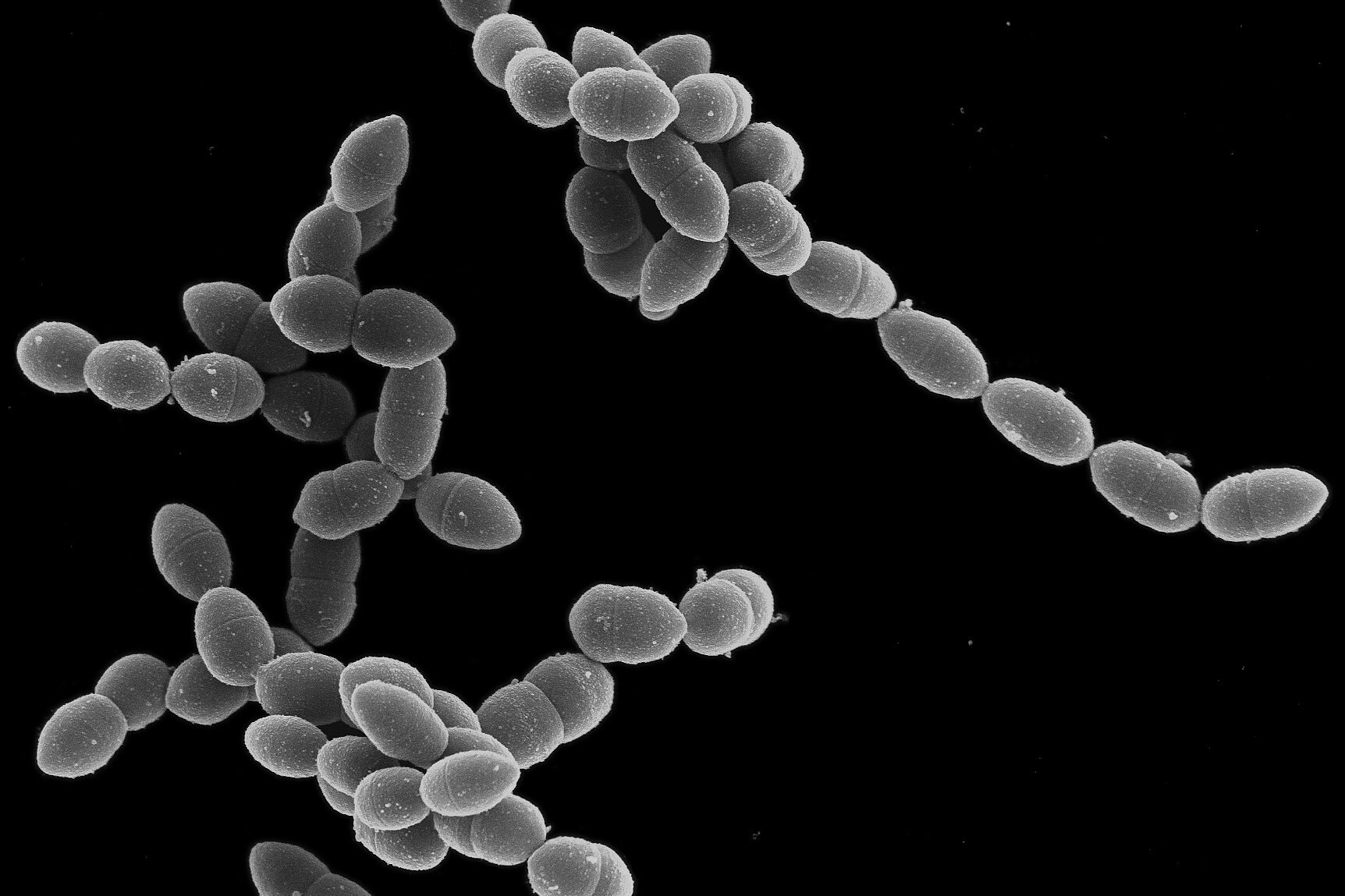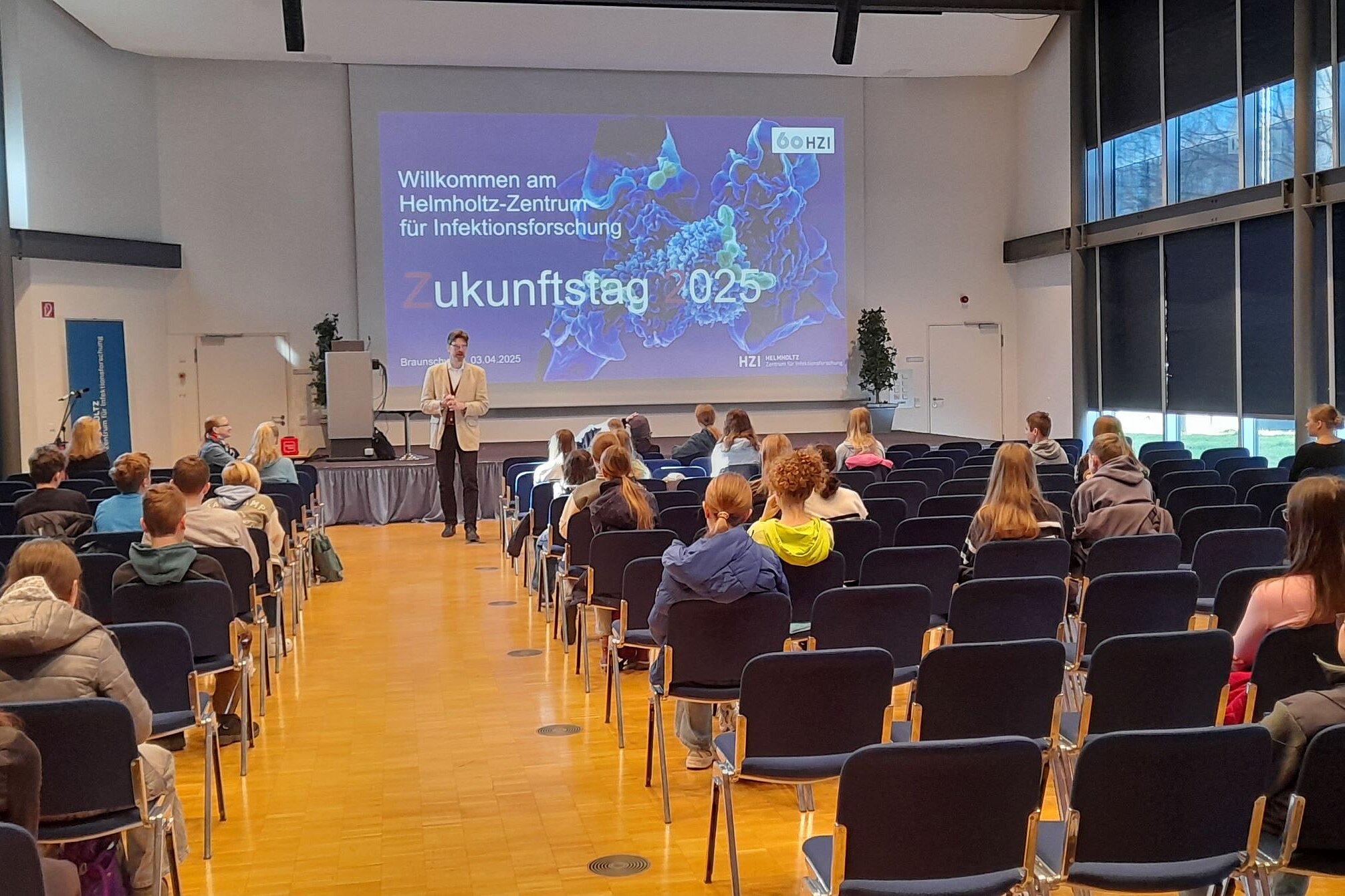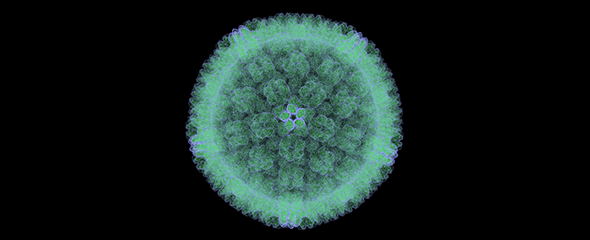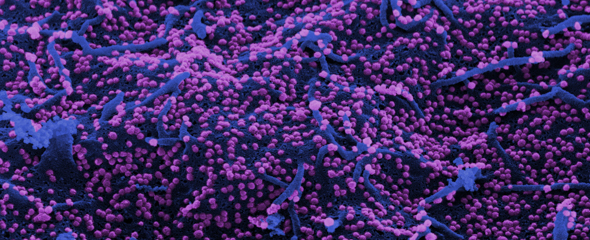Author count: 6
Grimpe P., Melcher L., Gröbe L., Huehn J., Boehme J.D., Bruder D.
(2025)
Isolation of Alveolar Type II Epithelial Cells from Neonatal, Juvenile, and Adult Murine Lungs Adaptable to Infectious Experimental Settings
J.Visualized Exp.,
2025-December
(226)
Author count: 8
Carmo-Fernandes A., Tafrishi N., Bessen C., Katsoulis-Dimitriou K., Greweling-Pils M.C., Bruder D., ... , Plaza-Sirvent C., Schmitz I.
(2026)
The cell death regulator c-FLIPR impairs natural killer cell responses during influenza a virus infection
J.Mol.Med.,
104
(1)
Author count: 11
Negele J., Franz T., Krone A., Roder M., Gelmez E., Jantz-Naeem N., Kershaw O., Keitel V., Jeron A., ... , Bruder D., Kahlfuss S.
(2025)
Atypical Mitochondrial Phenotype of Colonic CD4+ and CD8+ T Cells During Experimental Chronic Colitis
Biomedicines,
13
(9)
Author count: 9
Boehme J.D., Jeron A., Schultz K., Melcher L., Schott K., Gelmez E., Kröger A., ... , Stegemann-Koniszewski S., Bruder D.
(2025)
Epigenetic changes and serotype-specific responses of alveolar type II epithelial cells to Streptococcus pneumoniae in resolving influenza A virus infection
Cell Commun.Signal.,
23
(1)
Author count: 21
Hochnadel I., Hoenicke L., Petriv N., Suo H., Groebe L., Olijnik C., Bondarenko N., Alfonso J.C., Jarek M., Shi R., Jeron A., Timrott K., Hirsch T., Jedicke N., Bruder D., Klawonn F., Lichtinghagen R., Geffers R., Lenzen H., ... , Manns M.P., Yevsa T.
(2025)
In vivo RNAi screen and validation reveals Ngp, Hba-a1, and S100a8 as novel inhibitory targets on T lymphocytes in liver cancer
Frontiers in Immunology,
16
Author count: 12
Kotrba J., M++ller I., Pausder A., Hoffmann A., Camp B., Boehme J.D., M++ller A.J., Schreiber J., Bruder D., Kahlfuss S., ... , Dudeck A., Stegemann-Koniszewski S.
(2024)
Innate players in Th2 and non-Th2 asthma: emerging roles for the epithelial cell, mast cell, and monocyte/macrophage network
American Journal of Physiology - Cell Physiology,
327
(6)
Author count: 4
Booth J.S., Wahid R., Bruder D., Salerno-Goncalves R.
(2024)
Editorial: The synthesis of secretory immunoglobulin A in mucosal tissue: mucosal-associated invariant T, T follicular helper, and B cells
Front Immunol.,
15
Author count: 8
Franz T., Stegemann-Koniszewski S., Schreiber J., Müller A., Bruder D., Dudeck A., ... , Boehme J.D., Kahlfuss S.
(2024)
Metabolic and ionic control of T cells in asthma endotypes
Am.J.Physiol Cell Physiol,
327
(5)
Author count: 25
Röwekamp I., Maschirow L., Rabes A., Fiocca Vernengo F., Hamann L., Heinz G.A., Mashreghi M.F., Caesar S., Milek M., Fagundes Fonseca A.C., Wienhold S.M., Nouailles G., Yao L., Mousavi S., Bruder D., Boehme J.D., Puzianowska-Kuznicka M., Beule D., Witzenrath M., CAPNETZ Study Group, Löning M., Klose C.S.N., Heimesaat M.M., ... , Diefenbach A., Opitz B.
(2024)
IL-33 controls IL-22-dependent antibacterial defense by modulating the microbiota
Proceedings of the National Academy of Sciences of the United States of America,
121
(22)
Author count: 8
Camp B., Jorde I., Sittel F., Pausder A., Jeron A., Bruder D., ... , Schreiber J., Stegemann-Koniszewski S.
(2024)
Comprehensive analysis of lung macrophages and dendritic cells in two murine models of allergic airway inflammation reveals model- and subset-specific accumulation and phenotypic alterations
Front.Immunol.,
15
Author count: 14
Brandt S., Bernhardt A., Häberer S., Wolters K., Gehringer F., Reichardt C., Krause A., Geffers R., Kahlfuß S., Jeron A., Bruder D., Lindquist J.A., ... , Isermann B., Mertens P.R.
(2024)
Comparative Analysis of Acute Kidney Injury Models and Related Fibrogenic Responses: Convergence on Methylation Patterns Regulated by Cold Shock Protein
Cells,
13
(5)
Author count: 14
Dogra T., Pelz L., Boehme J.D., Kuechler J., Kershaw O., Marichal-Gallardo P., Baelkner M., Hein M.D., Gruber A.D., Benndorf D., Genzel Y., Bruder D., ... , Kupke S.Y., Reichl U.
(2023)
Generation of "OP7 chimera" defective interfering influenza A particle preparations free of infectious virus that show antiviral efficacy in mice
Sci.Rep.,
13
(1)
Author count: 13
Vogel K., Arra A., Lingel H., Bretschneider D., Prätsch F., Schanze D., Zenker M., Balk S., Bruder D., Geffers R., Hachenberg T., ... , Arens C., Brunner-Weinzierl M.C.
(2023)
Bifidobacteria shape antimicrobial T-helper cell responses during infancy and adulthood
Nat.Commun.,
14
(1)
Author count: 10
Brauns S., Marquardt I., Thon C., Frentzel S., Jakob J., Färber J., Philipsen L., Jänsch L., ... , Link A., Bruder D.
(2023)
Mucosal-associated invariant T (MAIT) cells from Clostridioides difficile-infected patients exhibit a distinct proinflammatory phenotype and enhanced cytotoxic activity
Int.Immunol.
Author count: 3
Stegemann-Koniszewski S., Frentzel S., Bruder D.
(2023)
Good and bad outcomes of respiratory viral infections-influenza A virus trains sustained antitumor immunity of macrophages in the lung
Cellular and Molecular Immunology
Author count: 5
Jakob J., Kröger A., Klawonn F., Bruder D., J+ñnsch L.
(2023)
Translatome analyses by bio-orthogonal non-canonical amino acid labeling reveal that MR1-activated MAIT cells induce an M1 phenotype and antiviral programming in antigen-presenting monocytes
Front.Immunol.,
14
Author count: 14
Metzdorf K., Jacobsen H., Greweling-Pils M.C., Hoffmann M., Lüddecke T., Miller F., Melcher L., Kempf A.M., Nehlmeier I., Bruder D., Widera M., Ciesek S., ... , Pöhlmann S., Cicin-Sain L.
(2023)
TMPRSS2 Is Essential for SARS-CoV-2 Beta and Omicron Infection
Viruses,
15
(2)
Author count: 7
Frentzel S., Jeron A., Pausder A., Kershaw O., Volckmar J., ... , Schmitz I., Bruder D.
(2022)
I k
Front.Immunol.,
13
Author count: 10
Abdi Sarabi M., Shiri A., Aghapour M., Reichardt C., Brandt S., Mertens P.R., Medunjanin S., Bruder D., ... , Braun-Dullaeus R.C., Weinert S.
(2022)
Normoxic HIF-1 a
Cells,
11
(23)
Author count: 13
Jhutty S.S., Boehme J.D., Jeron A., Volckmar J., Schultz K., Schreiber J., Schughart K., Zhou K., Steinheimer J., Stöcker H., Stegemann-Koniszewski S., ... , Bruder D., Hernandez-Vargas E.A.
(2022)
Predicting Influenza A Virus Infection in the Lung from Hematological Data with Machine Learning
mSystems.
Author count: 12
Wenzek C., Steinbach P., Wirsdörfer F., Sutter K., Boehme J.D., Geffers R., Klopfleisch R., Bruder D., Jendrossek V., Buer J., ... , Westendorf A.M., Knuschke T.
(2022)
CD47 restricts antiviral function of alveolar macrophages during influenza virus infection
iScience,
25
(12)
Author count: 9
Pausder A., Mras P., Hoenicke L., Waldburg N., Lesker T.R., Schreiber J., Strowig T., ... , Boehme J.D., Bruder D.
(2022)
Altered nasal microbiota in asthmatic patients is not related to changes in secretory immunity in the nasopharynx
Clin.Exp.Allergy
Author count: 12
Cammann C., Israel N., Frentzel S., Jeron A., Topfstedt E., ler T., Simeoni L., Zenker M., Fehling H.J., Schraven B., ... , Bruder D., Seifert U.
(2022)
T cell-specific constitutive active SHP2 enhances T cell memory formation and reduces T cell activation
Front Immunol,
13
Author count: 10
Gelmez E., Lehr K., Kershaw O., Frentzel S., Vilchez-Vargas R., Bank U., Link A., Schüler T., ... , Jeron A., Bruder D.
(2022)
Characterization of Maladaptive Processes in Acute, Chronic and Remission Phases of Experimental Colitis in C57BL/6 Mice
Biomedicines.,
10
(8)
Author count: 3
Volckmar J., Melcher L., Bruder D.
(2022)
Route, origin & valence matter: towards sophisticated next-generation vaccines to cope with the COVID-19 pandemic
Signal.Transduct.Target Ther.,
7
(1)
Author count: 11
Aghapour M., Tulen C.B.M., Abdi Sarabi M., Weinert S., Müsken M., Relja B., van Schooten F.J., Jeron A., Braun-Dullaeus R., ... , Remels A.H., Bruder D.
(2022)
Cigarette Smoke Extract Disturbs Mitochondria-Regulated Airway Epithelial Cell Responses to Pneumococci
Cells,
11
(11)
Author count: 17
Hochnadel I., Hoenicke L., Petriv N., Neubert L., Reinhard E., Hirsch T., Alfonso J.C.L., Suo H., Longerich T., Geffers R., Lichtinghagen R., Guzmán C.A., Wedemeyer H., Lenzen H., Manns M.P., ... , Bruder D., Yevsa T.
(2022)
Correction: Safety and efficacy of prophylactic and therapeutic vaccine based on live-attenuated Listeria monocytogenes in hepatobiliary cancers (Oncogene, (2022), 41, 14, (2039-2053), 10.1038/s41388-022-02222-z)
Oncogene,
41
(19)
Author count: 3
Aghapour M., Surender S., Bruder D.
(2022)
Beware the intruder: gasodermin A as molecular guardian preventing systemic dissemination of group A streptococci following local skin infection
Cell Mol.Immunol.
Author count: 7
Aghapour M., Ubags N.D., Bruder D., Hiemstra P.S., Sidhaye V., ... , Rezaee F., Heijink I.H.
(2022)
Role of air pollutants in airway epithelial barrier dysfunction in asthma and COPD
Eur Respir Rev,
31
(163)
Author count: 17
Hochnadel I., Hoenicke L., Petriv N., Neubert L., Reinhard E., Hirsch T., Alfonso J.C.L., Suo H., Longerich T., Geffers R., Lichtinghagen R., Guzmán C.A., Wedemeyer H., Lenzen H., Manns M.P., ... , Bruder D., Yevsa T.
(2022)
Safety and efficacy of prophylactic and therapeutic vaccine based on live-attenuated Listeria monocytogenes in hepatobiliary cancers
Oncogene
Author count: 3
Gelmez E., Jeron A., Bruder D.
(2022)
Negative elongation factor: a key factor in the maintenance of intestinal epithelial barrier integrity
Cell Mol.Immunol.
Author count: 21
Kim Y., Zheng X., Eschke K., Chaudhry M.Z., Bertoglio F., Tomic A., Krmpotic A., Hoffmann M., Bar-On Y., Boehme J., Bruder D., Ebensen T., Brunotte L., Ludwig S., Messerle M., Guzmán C., Mandelboim O., Hust M., Pöhlmann S., ... , Jonjic S., Cicin-Sain L.
(2022)
MCMV-based vaccine vectors expressing full-length viral proteins provide long-term humoral immune protection upon a single-shot vaccination
Cell Mol.Immunol.,
19
(2)
Author count: 7
Pausder A., Fricke J., Schughart K., Schreiber J., Strowig T., ... , Bruder D., Boehme J.D.
(2021)
Exogenous and Endogenous Triggers Differentially Stimulate Pigr Expression and Antibacterial Secretory Immunity in the Murine Respiratory Tract
Lung
Author count: 13
Düsedau H.P., Steffen J., Figueiredo C.A., Boehme J.D., Schultz K., Erck C., Korte M., Faber-Zuschratter H., Smalla K.H., Dieterich D., Kröger A., ... , Bruder D., Dunay I.R.
(2021)
Influenza A Virus (H1N1) Infection Induces Microglial Activation and Temporal Dysbalance in Glutamatergic Synaptic Transmission
MBio.,
12
(5)
Author count: 12
Böning M.A.L., Parzmair G.P., Jeron A., Düsedau H.P., Kershaw O., Xu B., Relja B., Schlüter D., Dunay I.R., Reinhold A., ... , Schraven B., Bruder D.
(2021)
Enhanced Susceptibility of ADAP-Deficient Mice to Listeria monocytogenes Infection Is Associated With an Altered Phagocyte Phenotype and Function
Frontiers in Immunology,
12
Author count: 8
Ruhnau J., Grote V., Juarez-Osorio M., Bruder D., Mahour R., Rapp E., ... , Rexer T.F.T., Reichl U.
(2021)
Cell-Free Glycoengineering of the Recombinant SARS-CoV-2 Spike Glycoprotein
Front.Bioeng.Biotechnol.,
9
Author count: 9
Rand U., Kupke S.Y., Shkarlet H., Hein M.D., Hirsch T., Marichal-Gallardo P., Cicin-Sain L., ... , Reichl U., Bruder D.
(2021)
Antiviral Activity of Influenza A Virus Defective Interfering Particles against SARS-CoV-2 Replication In Vitro through Stimulation of Innate Immunity
Cells,
10
(7)
Author count: 8
Elfaki Y., Yang J., Boehme J., Schultz K., Bruder D., Falk C.S., ... , Hühn J., Floess S.
(2021)
Tbx21 and foxp3 are epigenetically stabilized in t-bet+ tregs that transiently accumulate in influenza a virus-infected lungs
Int.J.Mol.Sci.,
22
(14)
Author count: 11
Hoang Q.T.M., Nguyen V.K., Oberacher H., Fuchs D., Hernandez-Vargas E.A., Borucki K., Waldburg N., Wippermann J., Schreiber J., ... , Bruder D., Veluswamy P.
(2021)
Serum Concentration of the Phytohormone Abscisic Acid Is Associated With Immune-Regulatory Mediators and Is a Potential Biomarker of Disease Severity in Chronic Obstructive Pulmonary Disease
Frontiers in Medicine,
8
Author count: 1
Bruder D.
(2020)
Influenza - Prävalenz, Bedeutung und Implikationen für die Prävention und Gesundheitsförderung
(68-1)
Author count: 8
Volckmar J., Knop L., Hirsch T., Frentzel S., Erck C., Van Ham M., ... , Stegemann-Koniszewski S., Bruder D.
(2021)
Chemical conjugation of a purified dec-205-directed antibody with full-length protein for targeting mouse dendritic cells in vitro and in vivo
J.Visualized Exp.,
2021
(168)
Author count: 21
Roth S., Cao J., Singh V., Tiedt S., Hundeshagen G., Li T., Boehme J.D., Chauhan D., Zhu J., Ricci A., Gorka O., Asare Y., Yang J., Lopez M.S., Rehberg M., Bruder D., Zhang S., Groß O., Dichgans M., ... , Hornung V., Liesz A.
(2021)
Post-injury immunosuppression and secondary infections are caused by an AIM2 inflammasome-driven signaling cascade
Immunity.,
54
(4)
Author count: 9
Elfaki Y., Robert P.A., Binz C., Falk C.S., Bruder D., Prinz I., Floess S., ... , Meyer-Hermann M., Hühn J.
(2021)
Influenza A virus-induced thymus atrophy differentially affects dynamics of conventional and regulatory T cell development in mice
Eur.J.Immunol.
Author count: 7
Wu Q., Jorde I., Kershaw O., Jeron A., Bruder D., ... , Schreiber J., Stegemann-Koniszewski S.
(2020)
Resolved influenza a virus infection has extended effects on lung homeostasis and attenuates allergic airway inflammation in a mouse model
Microorg.,
8
(12)
Author count: 13
Luecke E., Jeron A., Kroeger A., Bruder D., Stegemann-Koniszewski S., Jechorek D., Borucki K., Reinhold D., Reinhold A., Foellner S., Walles T., ... , Hachenberg T., Schreiber J.
(2021)
Eosinophilic pulmonary vasculitis as a manifestation of the hyperinflammatory phase of COVID-19
J Allergy Clin Immunol.,
147
(1)
Author count: 7
Ogger P.P., Silva J.D., Aghapour M., Persson I.M., Tulen C., ... , Jurkowska R., Ubags N.D.
(2020)
Early career members at the ERS lung science conference 2020: Metabolic alterations in lung ageing and disease
Breathe,
16
(3)
Author count: 3
Boehme J.D., Frentzel S., Bruder D.
(2020)
NMP4: a nuclear driver of innate inflammatory responses during influenza A virus infection
Cell.Mol.Immunol,
17
(12)
Author count: 3
Sasaki K., Bruder D., Hernandez-Vargas E.A.
(2020)
Topological data analysis to model the shape of immune responses during co-infections
Comm.Nonlinear Sci.Numer.Simul.,
85
(June 2020)
Author count: 14
Böning M.A.L., Trittel S., Riese P., Van Ham M., Heyner M., Voss M., Parzmair G.P., Klawonn F., Jeron A., Guzmán C.A., Jänsch L., Schraven B., ... , Reinhold A., Bruder D.
(2020)
ADAP Promotes Degranulation and Migration of NK Cells Primed During in vivo Listeria monocytogenes Infection in Mice
Front.Immunol.,
10
Author count: 7
Aghapour M., Remels A.H.V., Pouwels S.D., Bruder D., Hiemstra P.S., ... , Cloonan S.M., Heijink I.H.
(2020)
Mitochondria: At the crossroads of regulating lung epithelial cell function in chronic obstructive pulmonary disease
Am.J.Physiol.Lung Cell.Mol.Physiol.,
318
(1)
Author count: 12
Zheng X., Oduro J.D., Boehme J.D., Borkner L., Ebensen T., Heise U., Gereke M., Pils M.C., Krmpotic A., Guzmán C.A., ... , Bruder D., Cicin-Sain L.
(2019)
Mucosal CD8+ T cell responses induced by an MCMV based vaccine vector confer protection against influenza challenge
PLoS Pathog.,
15
(9)
Author count: 9
Sharma-Chawla N., Stegemann-Koniszewski S., Christen H., Boehme J.D., Kershaw O., Schreiber J., Guzmán C.A., ... , Bruder D., Hernandez-Vargas E.A.
(2019)
In vivo Neutralization of Pro-inflammatory Cytokines During Secondary Streptococcus pneumoniae Infection Post Influenza A Virus Infection
Front Immunol.,
10
Author count: 7
Volckmar J., Knop L., Stegemann-Koniszewski S., Schulze K., Ebensen T., ... , Guzmán C.A., Bruder D.
(2019)
The STING activator c-di-AMP exerts superior adjuvant properties than the formulation poly(I:C)/CpG after subcutaneous vaccination with soluble protein antigen or DEC-205-mediated antigen targeting to dendritic cells
Vaccine,
37
(35)
Author count: 5
Frentzel S., Katsoulis-Dimitriou K., Jeron A., Schmitz I., Bruder D.
(2019)
Essential role of IkappaBNS for in vivo CD4(+) T cell activation, proliferation and Th1 cell differentiation during Listeria monocytogenes infection in mice
Eur.J.Immunol.,
49
(9)
Author count: 8
Schultz K., Grieger C., Li Y., Ruschel A., Minnich K., Bruder D., ... , Gereke M., Sechi A.
(2018)
Gamma secretase dependent release of the CD44 cytoplasmic tail upregulates IFI16 in cd44-/- tumor cells, MEFs and macrophages
PLoS ONE,
13
(12)
Author count: 13
Abdissa K., Nerlich A., Beineke A., Ruangkiattikul N., Pawar V., Heise U., Janze N., Falk C., Bruder D., Schleicher U., Bogdan C., ... , Weiss S., Goethe R.
(2018)
Presence of infected Gr-1intCD11bhiCD11cintmonocytic myeloid derived suppressor cells subverts T cell response and is associated with impaired dendritic cell function in Mycobacterium avium-infected mice
Front.Immunol.,
9
(OCT)
Author count: 6
Liakopoulos V., Jeron A., Shah A., Bruder D., Mertens P.R., Gorny X.
(2018)
Hemodialysis-related changes in phenotypical features of monocytes
Sci.Rep.,
8
(1)
Author count: 10
Jeron A., Boehme J.D., Volckmar J., Gereke M., Yevsa T., Geffers R., Guzmán C.A., Schreiber J., ... , Stegemann-Koniszewski S., Bruder D.
(2018)
Respiratory bordetella bronchiseptica carriage is associated with broad phenotypic alterations of peripheral CD4+CD25+ T cells and differentially affects immune responses to secondary non-infectious and infectious stimuli in mice
Int.J.Mol.Sci.,
19
(9)
Author count: 2
Veluswamy P., Bruder D.
(2018)
PD-1/PD-L1 pathway inhibition to restore effector functions in exhausted CD8+ T cells: Chances, limitations and potential risks
Transl.Cancer Res.,
7
(Supplement 4 (April))
Author count: 8
Bulitta B., Zuschratter W., Bernal I., Bruder D., Klawonn F., von Bergen M., ... , Garritsen H.S.P., Jänsch L.
(2018)
Proteomic definition of human mucosal-associated invariant T cells determines their unique molecular effector phenotype
Eur.J.Immunol.,
48
(8)
Author count: 10
Stegemann-Koniszewski S., Behrens S., Boehme J.D., Hochnadel I., Riese P., Guzmán C.A., Kröger A., Schreiber J., ... , Gunzer M., Bruder D.
(2018)
Respiratory influenza A virus infection triggers local and systemic natural killer cell activation via toll-like receptor 7
Front.Immunol.,
9
(FEB)
Author count: 11
Frede A., Neuhaus B., Knuschke T., Wadwa M., Kollenda S., Klopfleisch R., Hansen W., Buer J., Bruder D., ... , Epple M., Westendorf A.M.
(2017)
Local delivery of siRNA-loaded calcium phosphate nanoparticles abates pulmonary inflammation
Nanomedicine.,
13
(8)
Author count: 2
Boehme J.D., Bruder D.
(2017)
IL-33: a jack of all trades in the orchestration of respiratory antibacterial immunity
Cell Mol.Immunol.,
14
(11)
Author count: 8
Boehme J.D., Stegemann-Koniszewski S., Autengruber A., Peters N., Wissing J., Jänsch L., ... , Jeron A., Bruder D.
(2017)
Chronic lung inflammation primes humoral immunity and augments antipneumococcal resistance
Sci.Rep.,
7
(1)
Author count: 7
Mracsko E., Stegemann-Koniszewski S., Na S.Y., Dalpke A., Bruder D., ... , Lasitschka F., Veltkamp R.
(2017)
A Mouse Model of Post-Stroke Pneumonia Induced by Intra-Tracheal Inoculation with Streptococcus pneumoniae
Cerebrovasc.Dis.,
43
(3-4)
Author count: 14
Volckmar J., Gereke M., Ebensen T., Riese P., Philipsen L., Lienenklaus S., Wohlleber D., Klopfleisch R., Stegemann-Koniszewski S., Muller A.J., Gruber A.D., Knolle P., ... , Guzmán C.A., Bruder D.
(2017)
Targeted antigen delivery to dendritic cells elicits robust antiviral T cell-mediated immunity in the liver
Sci Rep.,
7
(Mar)
Author count: 8
Sharma-Chawla N., Sender V., Kershaw O., Gruber A.D., Volckmar J., Henriques-Normark B., ... , Stegemann-Koniszewski S., Bruder D.
(2016)
Influenza A virus infection predisposes hosts to secondary infection with different Streptococcus pneumoniae serotypes with similar outcome but serotype-specific manifestation
Infect.Immun.,
84
(12)
Author count: 9
Sakthivel P., Breithaupt A., Gereke M., Copland D.A., Schulz C., Gruber A.D., Dick A.D., ... , Schreiber J., Bruder D.
(2016)
Soluble CD200 Correlates With Interleukin-6 Levels in Sera of COPD Patients: Potential Implication of the CD200/CD200R Axis in the Disease Course
Lung,
159
Author count: 7
Duvigneau S., Sharma-Chawla N., Boianelli A., Stegemann-Koniszewski S., Nguyen V.K., ... , Bruder D., Hernandez-Vargas E.A.
(2016)
Hierarchical effects of pro-inflammatory cytokines on the post-influenza susceptibility to pneumococcal coinfection
Sci Rep.,
6
Author count: 5
Pieler M.M., Frentzel S., Bruder D., Wolff M.W., Reichl U.
(2016)
A cell culture-derived whole virus influenza A vaccine based on magnetic sulfated cellulose particles confers protection in mice against lethal influenza A virus infection
Vaccine,
34
(50)
Author count: 2
Sakthivel P., Bruder D.
(2016)
Mechanism of granuloma formation in sarcoidosis
Curr Opin.Hematol.,
24
(1)
Author count: 9
Parzmair G.P., Gereke M., Haberkorn O., Annemann M., Podlasly L., Kliche S., Reinhold A., ... , Schraven B., Bruder D.
(2016)
ADAP plays a pivotal role in CD4+ T cell activation but is only marginally involved in CD8+ T cell activation, differentiation, and immunity to pathogens
J Leukoc.Biol.,
101
(2)
Author count: 4
Boianelli A., Sharma-Chawla N., Bruder D., Hernandez-Vargas E.A.
(2016)
Oseltamivir PK/PD Modeling and Simulation to Evaluate Treatment Strategies against Influenza-Pneumococcus Coinfection
Front Cell Infect.Microbiol.,
6
Author count: 5
Sakthivel P., Sharma N., Klahn P., Gereke M., Bruder D.
(2016)
Abscisic acid: A phytohormone and mammalian cytokine as novel pharmacon with potential for future development into clinical applications
Curr.Med.Chem.,
23
(15)
Author count: 7
Stegemann-Koniszewski S., Jeron A., Gereke M., Geffers R., Kroger A., ... , Gunzer M., Bruder D.
(2016)
Alveolar Type II Epithelial Cells Contribute to the Anti-Influenza A Virus Response in the Lung by Integrating Pathogen- and Microenvironment-Derived Signals
MBio.,
7
(3)
Author count: 18
Rolle A.M., Hasenberg M., Thornton C.R., Solouk-Saran D., Weski J., Maurer A., Fischer E., Spycher P.R., Schibli R., Boschetti F., Stegemann-Koniszewski S., Bruder D., Severin G.W., Autenrieth S.E., Krappmann S., Davies G., ... , Pichler B.J., Gunzer M.
(2016)
ImmunoPET/MR imaging allows specific detection of Aspergillus fumigatus lung infection in vivo
Proc.Natl.Acad.Sci.U.S.A.,
113
(8)
Author count: 9
Petzold C., Steinbronn N., Gereke M., Strasser R.H., Sparwasser T., Bruder D., Geffers R., ... , Schallenberg S., Kretschmer K.
(2014)
Fluorochrome-based definition of naturally occurring Foxp3+ regulatory T cells of intra- and extrathymic origin
Eur.J.Immunol.,
44
(12)
Author count: 5
Désiréé Boehme J., Pietkiewicz S., Lavrik I., Jeron A., Bruder D.
(2015)
Morphological and Functional Alterations of Alveolar Macrophages in a Murine Model of Chronic Inflammatory Lung Disease
Lung,
193
(6)
Author count: 5
Boehme J.D., Pietkiewicz S., Lavrik I., Jeron A., Bruder D.
(2015)
Erratum to: Morphological and Functional Alterations of Alveolar Macrophages in a Murine Model of Chronic Inflammatory Lung Disease
Lung,
193
Author count: 12
Boianelli A., Nguyen V.K., Ebensen T., Schulze K., Wilk E., Sharma N., Stegemann-Koniszewski S., Bruder D., Toapanta F.R., Guzmán C.A., ... , Meyer-Hermann M., Hernandez-Vargas E.A.
(2015)
Modeling influenza virus infection: A roadmap for influenza research
Viruses,
7
(10)
Author count: 5
Sakthivel P., Grunewald J., Eklund A., Bruder D., Wahlstrom J.
(2015)
Pulmonary sarcoidosis is associated with high-level ICOS expression on lung regulatory T cells - possible implications for the ICOS/ICOS-L axis in disease course and resolution
Clin.Exp.Immunol.,
183
Author count: 18
Yeruva S., Chodisetti G., Luo M., Chen M., Cinar A., Ludolph L., Lünnemann M., Goldstein J., Singh A.K., Riederer B., Bachmann O., Bleich A., Gereke M., Bruder D., Hagen S., He P., ... , Yun C., Seidler U.
(2015)
Evidence for a causal link between adaptor protein PDZK1 downregulation and Na+/H+ exchanger NHE3 dysfunction in human and murine colitis
Pflug.Arch.Eur.J.Physiol.,
467
(8)
Author count: 7
Biswas A., Bruder D., Wolf S.A., Jeron A., Mack M., ... , Heimesaat M.M., Dunay I.R.
(2015)
Ly6Chigh monocytes control cerebral toxoplasmosis
J.Immunol.,
194
(7)
Author count: 6
Tschernig T., Hartwig C., Jeron A., Dinh Q.T., Gereke M., Bruder D.
(2015)
First genomic analysis of dendritic cells from lung and draining lymph nodes in murine asthma
Int.J Genomics,
2015
Author count: 8
Sakthivel P., Gereke M., Breithaupt A., Fuchs D., Gigliotti L., Gruber A.D., ... , Dianzani U., Bruder D.
(2014)
Attenuation of immune-mediated influenza pneumonia by targeting the inducible co-stimulator (ICOS) molecule on T cells
PLoS ONE,
9
(7)
Author count: 11
Nair Sharmila, Michaelsen-Preusse K., Finsterbusch Katja, Stegemann-Koniszewski Sabine, Bruder Dunja, Grashoff Martina, Korte Martin, Köster Mario, Kalinke Ulrich, ... , Hauser Hansjörg, Kröger Andrea
(2014)
Interferon regulatory factor-1 protects from fatal neurotropic infection with vesicular stomatitis virus by specific inhibition of viral replication in neurons
PLoS Pathogens,
10
(3)
Author count: 15
Kominsky D.J., Campbell E.L., Ehrentraut S.F., Wilson K.E., Kelly C.J., Glover L.E., Collins C.B., Bayless A.J., Saeedi B., Dobrinskikh E., Bowers B.E., Macmanus C.F., Muller W., ... , Colgan S.P., Bruder Dunja
(2014)
IFN-gamma-Mediated Induction of an Apical IL-10 Receptor on Polarized Intestinal Epithelia
Journal of Immunology,
192
(3)
Author count: 12
Martinez J.P., Perez-Vilaro G., Muthukumar Y., Scheller N., Hirsch Tatjana, Diestel R., Steinmetz Heinrich, Jansen Rolf, Frank Ronald, Sasse Florenz, ... , Meyerhans A., Diez J.
(2013)
Screening of small molecules affecting mammalian P-body assembly uncovers links with diverse intracellular processes and organelle physiology
RNA Biology,
10
(11)
Author count: 3
Sakthivel Priya, Gereke Marcus, Bruder Dunja
(2012)
Therapeutic intervention in cancer and chronic viral infections: antibody mediated manipulation of PD-1/PD-L1 interaction
Review on Recent Clinical Trials,
7
(1)
Author count: 6
Jeron A., Hansen W., Ewert F., Buer J., Geffers R., Bruder D.
(2012)
ChIP-on-chip analysis identifies IL-22 as direct target gene of ectopically expressed FOXP3 transcription factor in human T cells
BMC GENOMICS,
13
(1)
Author count: 6
Gereke Marcus, Autengruber A., Gröe Lothar, Jeron A., Bruder Dunja, Stegemann-Koniszewski S.
(2012)
Flow cytometric isolation of primary murine type II alveolar epithelial cells for functional and molecular studies
Journal of Visualized Experiments: JoVE
(70)
Author count: 11
Telieps T., Ewald F., Gereke M., Annemann M., Rauter Y., Schuster M., Ueffing N., von Smolinski D., Gruber A.D., ... , Bruder D., Schmitz I.
(2013)
Cellular-FLIP, Raji isoform (c-FLIPR) modulates cell death induction upon T-cell activation and infection
European Journal of Immunology,
43
(6)
Author count: 5
Autengruber Andrea, Gereke Marcus, Hansen G., Hennig C., Bruder Dunja
(2012)
Impact of enzymatic tissue disintegration on the level of surface molecule expression and immune cell function
European Journal of Microbiology and Immunology,
2
(2)
Author count: 12
Stegemann-Koniszewski S., Gereke M., Orrskog S., Lienenklaus S., Pasche B., Bader S.R., Gruber A.D., Akira S., Weiss Siegfried, Henriques-Normark B., ... , Bruder Dunja, Gunzer M.
(2012)
TLR7 Contributes to the Rapid Progression but Not to the Overall Fatal Outcome of Secondary Pneumococcal Disease following Influenza A Virus Infection
Journal of Innate Immunity,
5
(1)
Author count: 3
Hasenberg M., Stegemann-Koniszewski S., Gunzer Matthias*
(2013)
Cellular immune reactions in the lung
Immunological Reviews,
251
(1)
Author count: 6
Tosiek M.J., Bader S.R., Gruber A.D., Buer J., Gereke M., Bruder Dunja
(2012)
CD8+ T Cells Responding to Alveolar Self-Antigen Lack CD25 Expression and Fail to Precipitate Autoimmunity
American Journal of Respiratory Cell and Molecular Biology,
47
(6)
Author count: 7
Albrecht M., Arnhold M., Lingner S., Mahapatra S., Bruder Dunja, ... , Hansen G., Dittrich A.M.
(2012)
IL-4 Attenuates Pulmonary Epithelial Cell-Mediated Suppression of T Cell Priming
PLoS ONE,
7
(9)
Author count: 7
König S., Probst-Kepper M., Reinl T., Jeron A., Hühn Jochen, ... , Schraven B., Jänsch Lothar
(2012)
First insight into the kinome of human regulatory T cells
PLoS ONE,
7
(7)
Author count: 5
Hasenberg M., Köhler A., Jeron A., Bonifatius S., Gunzer M.
(2011)
Direct observation of phagocytosis and NET formation by neutrophils in infected lungs using 2-photon microscopy3332
Journal of Visualized Experiments,
52
(art. no. e2659)
Author count: 9
Alberts R., Chen H., Pommerenke C., Smit A.B., Spijker S., Williams R.W., Geffers Robert*, ... , Bruder Dunja*, Schughart Klaus*
(2011)
Expression QTL mapping in regulatory and helper T cells from the BXD family of strains reveals novel cell-specific genes, gene-gene interactions and candidate genes for auto-immune disease1
BMC GENOMICS,
12
Author count: 25
Kang T.W., Yevsa T., Woller N., Hoenicke L., Wuestefeld T., Dauch D., Hohmeyer A., Gereke M., Rudalska R., Potapova A., Iken M., Vucur M., Weiss Siegfried*, Heikenwalder M., Khan S., Gil J., Bruder Dunja*, Manns M., Schirmacher P., Tacke F., Ott M., Luedde T., Longerich T., ... , Kubicka S., Zender Lars*
(2011)
Senescence surveillance of pre-malignant hepatocytes limits liver cancer development
Nature,
479
(7374)
Author count: 10
Cappuccini F., Eldh T., Bruder Dunja*, Gereke M., Jastrow H., Schulze-Osthoff K., Fischer U., Kohler D., ... , Stuschke M., Jendrossek V.
(2011)
New insights into the molecular pathology of radiation-induced pneumopathy
Radiotherapy and Oncology,
101
(1)
Author count: 10
Ukena S.N., Velaga S., Geffers Robert*, Grosse J., Baron U., Buchholz S., Stadler M., Bruder Dunja*, ... , Ganser A., Franzke A.
(2011)
Human regulatory T cells in allogeneic stem cell transplantation
Blood,
118
(13)
Author count: 9
Tosiek M.J., Gruber A.D., Bader S., Hoymann H.G., Mauel S., Tschwernig T., Buer J., ... , Gereke M., Bruder Dunja*
(2011)
CD4 +
Journal of Immunology,
186
(11)
Author count: 13
Liesz A., Zhou W., Mracskó E., Karcher S., Doerr H., Schwarting S., Sun L., Bruder Dunja*, Stegemann S., Cerwenka A., Sommer C., ... , Dalpke A., Veltkamp R.
(2011)
Inhibition of lymphocyte trafficking shields the brain against deleterious neuroinflammation after stroke
Brain,
134
(3)
Author count: 10
Bar-On L., Birnberg T., Lewis K.L., Edelson B.T., Bruder D., Hildner K., Buer J., Murphy K.M., ... , Reizis B., Jung S.
(2010)
CX3CR1+ CD8a[alpha]+ dendritic cells are a steady-state population related to plasmacytoid dendritic cells
Proceedings of the National Acadamy of Sciences of the United States of America,
107
(33)
Author count: 10
Bruns S., Kniemeyer O., Hasenberg M., Aimanianda V., Nietzsche S., Thywissen A., Jeron A., Latge J.P., ... , Brakhage A.A., Gunzer M.
(2010)
Production of extracellular traps against Aspergillus fumigatus in vitro and in infected lung tissue is dependent on invading neutrophils and influenced by hydrophobin RodA
PLoS Pathogens,
6
(4)
Author count: 19
Probst-Kepper M., Geffers R., Kroger A., Viegas N., Erck C., Hecht H.-J., Lünsdorf H., Roubin R., Moharregh-Khiabani D., Wagner K., Ocklenburg F., Jeron A., Garritsen H., Arstila T.P., Kekalainen E., Balling R., Hauser H., ... , Buer J., Weiss S.
(2009)
GARP: a key receptor controlling FOXP3 in human regulatory T cells
Journal of Cellular and Molecular Medicine,
13
(9)
Author count: 10
De Buhr M.F., Hedrich H.J., Westendorf Astrid M.*, Obermeier F., Hofmann C., Zschemisch N.H., Buer J., Bumann D., ... , Goyert S.M., Bleich A.
(2009)
Analysis of Cd14 as a genetic modifier of experimental inflammatory bowel disease (IBD) in mice
Inflammatory Bowel Diseases,
15
(12)
Author count: 12
Lienenklaus S., Cornitescu M., Zietara N., Lyszkiewicz M., Gekara N., Jablonska J., Edenhofer F., Rajewsky K., Bruder D., Hafner M., ... , Staeheli P., Weiss S.
(2009)
Novel reporter mouse reveals constitutive and inflammatory expression of IFN-beta in vivo
Journal of Immunology,
183
(5)
Author count: 8
Jeron A., Pfoertner S., Bruder Dunja*, Geffers Robert*, Hammerer P., Hofmann R., ... , Buer J., Schrader A.J.
(2009)
Frequency and Gene Expression Profile of Regulatory T Cells in Renal Cell Carcinoma
Tumor Biology,
30
(3)
Author count: 6
Barth K., Weinhold K., Guenther A., Linge A., Gereke Marcus*, Kasper M.
(2008)
Characterization of the molecular interaction between caveolin-1 and the P2X receptors 4 and 7 in E10 mouse lung alveolar epithelial cells
International Journal of Biochemistry and Cell Biology,
40
(10)
Author count: 4
Gereke M., Jung S., Buer J., Bruder D.
(2009)
Alveolar type II epithelial cells present antigen to CD4(+) T cells and induce Foxp3(+) regulatory T cells
American Journal of Respiratory and Critical Care Medicine,
179
(5)
Author count: 7
Stegemann S., Dahlberg S., Kroger A., Gereke M., Bruder Dunja*, ... , Henriques-Normark B., Gunzer Matthias*
(2009)
Increased susceptibility for superinfection with Streptococcus pneumoniae
PLoS ONE,
4
(3)
Author count: 7
Westendorf A.M., Fleissner D., Gröbe Lothar*, Jung S., Gruber A.D., ... , Hansen W., Buer J.
(2009)
CD4+Foxp3+ regulatory T cell expansion induced by antigen-driven interaction with intestinal epithelial cells independent of local dendritic cells
GUT,
58
(2)
Author count: 14
Ukena S.N., Singh A., Dringenberg U., Engelhardt R., Seidler U., Hansen W., Bleich A., Bruder Dunja*, Franzke A., Rogler G., Suerbaum S., Buer Jan*, ... , Gunzer F., Westendorf Astrid .M.*
(2007)
Probiotic Escherichia coli Nissle 1917 inhibits leaky gut by enhancing mucosal integrity
PLoS ONE,
2
(12)
Author count: 10
Hansen W., Westendorf A.M., Reinwald S., Bruder Dunja*, Deppenmeier S., Gröbe Lothar*, Probst-Kepper Michael*, Gruber A.D., ... , Geffers Robert*, Buer Jan*
(2007)
Chronic antigen stimulation in vivo induces a distinct population of antigen-specific Foxp3 -
Journal of Immunology,
179
Author count: 9
Gereke M., Gröbe L., Prettin S., Kasper M., Deppenmeier S., Gruber A.D., Enelow R.I., ... , Buer J., Bruder D.
(2007)
Phenotypic alterations in type II alveolar epithelial cells in CD4+ T cell mediated lung inflammation
Respiratory research,
8
Author count: 11
Pfoertner S., Jeron A., Probst-Kepper M., Guzmán C.A., Hansen W., Westendorf A.M., Toepfer T., Schrader A.J., Franzke A., ... , Buer J., Geffers R.
(2006)
Signatures of human regulatory T cells: an encounter with old friends and new players
Genome Biology,
7
Author count: 4
Westendorf A.M., Bruder D., Hansen W., Buer J.
(2006)
Intestinal epithelial antigen induces CD4+ T cells with regulatory phenotype in a transgenic autoimmune mouse model
Annals of the New York Academy of Sciences,
1072
Author count: 8
Westendorf A.M., Fleissner D., Deppenmeier S., Gruber A.D., Bruder D., Hansen H., ... , Liblau R., Buer J.
(2006)
Autoimmune-mediated intestinal inflammation - impact and regulation of antigen specific CD8+ T cells
Gastroenterology,
131
(2)
Author count: 3
Bruder Dunja*, Srikiatkhachorn A., Enelow R.I.
(2006)
Cellular immunity and lung injury in respiratory virus infection
Viral Immunology,
26
Author count: 6
Ramana C.V., Chintapalli J., Xu L., Alia C., Bruder Dunja*, Enelow R.I.
(2006)
Lung epithelial Stat1 and NF- B signalling in response to CD8+ T cell antigen recognition
Journal of Interferon and Cytokine Research,
26
Author count: 9
Hansen W., Loser K., Westendorf Astrid M.*, Bruder Dunja*, Pförtner S., Siewert C., Hühn J., ... , Beissert S., Buer Jan*
(2006)
GPR83-overexpression in naive CD4+CD25- T cells leads to the induction of Foxp3+ regulatory T cells in vivo
Journal of Immunology,
177
Author count: 11
Bruder Dunja*, Nussbaum A.K., Gakamsky D.M., Schirle M., Stevanovic S., Singh-Jasuja H., Darji A., Chakraborty T., Schild H., ... , Pecht I., Weiss Siegfried*
(2006)
Multiple synergizing factors contribute to the strength of the CD8+ T cell response against listeriolysin O
International immunology,
18


















